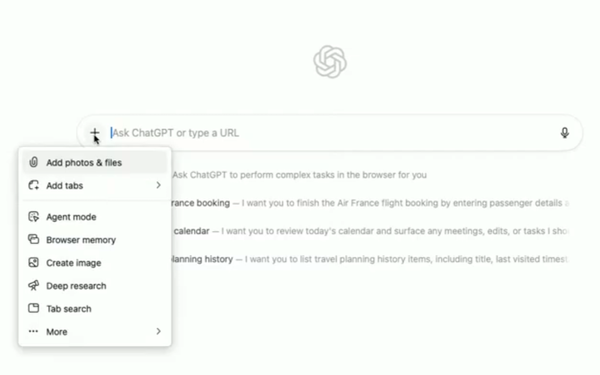
OpenAI has launched "Atlas," the company's AI-powered web
browser built around ChatGPT.
The browser follows the user across the web as the person traverses sites. It has a memory, and the pro version offers agentic agents to take action on behalf of
users.
"We think AI represents a rare once-in-a-decade opportunity to rethink what a browser can do," said Sam Altman, CEO at OpenAI, in a livestreamed event on Tuesday.
OpenAI designed Atlas to provide a more personalized web experience and will always feature
the "ask ChatGPT" button in the top right-hand corner. It can complete tasks such as booking flights and editing documents on a user’s behalf through agentic features in the pro version.
Each time a user visits a website within the browser, they will see an “Ask ChatGPT” that pulls up a sidebar to engage with the content on the page.
advertisement
advertisement
The user may request Atlas
to open a movie or restaurant review, which makes the chat with the browser natural, and then ask ChatGPT to summarize it, or find a recipe and ask ChatGPT to help place an online order for the
ingredients.
Making consumers or users more curious is the key to gaining users, according to one of OpenAI's developers.
The memory feature in the browser will become important,
according to Robert Kurtz, strategic business outcomes partner at Basis Technologies.
“From an advertising perspective, that could be key, pending how they treat cookies,"
Kurtz wrote in an email to MediaPost.
Memory could help advertisers connect ads to products or services, because Atlas would tie in the person's chat history. It could provide
valuable hints based on the season, signaling when a user might be “in-market” for a product or service before they start searching, Kurtz said.
Adam Fry, product lead for Atlas at
OpenAI, said during the livestreamed event that the chat feature follows the user across the web and also offers a “browser history.” This means ChatGPT can now log the websites
visited and what actions someone might take on them. The browser will use that information to personalize answers -- the first version of the offering.
Similar to other AI-powered
browsers that have been recently introduced from Google, Microsoft and Perplexity, this one features an AI agent that aims to automate web-based tasks on behalf of users.
Google, for example,
has integrated Gemini AI into the "Chrome" browser. Among other tasks, it can respond to requests and provide explanations of the web pages visited, condense information across multiple tabs, and even
bring back some of the websites previously closed.
OpenAI’s “agent mode” in the browser enables users to ask ChatGPT to complete small tasks in the
browser on their behalf. The company says the agent mode is only available to ChatGPT users on the Plus, Pro, and business tier at launch.
ChatGPT Atlas can interact with the Instacart
website, for example, to automate grocery shopping tasks. The integration showcases a progression from Instacart's existing AI features to a more advanced, browser-native AI assistant.
Atlas also lets the user pivot between text, videos and news stories from the home tab. Clicking on a link from a search result on Atlas, the browser will slide over the information without losing
the chat experience.